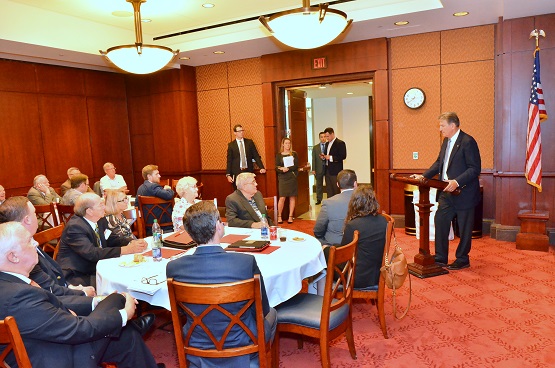News
Senator Manchin Co-Sponsors Regulatory Relief Legislation — 11/15/17

Senator Joe Manchin addresses League Hike the Hill participants on September 20, 2017 during a luncheon at the U.S. Capitol Visitors’ Center.
The U.S. Senate Banking Committee announced on November 13, an agreement on legislative proposals to improve our nation’s financial regulatory framework and promote economic growth. Last spring, the Banking Committee issued a request for legislative proposals from stakeholders, companies and consumers aimed at creating economic growth. The Committee subsequently held a series of hearings reviewing the proposals, and has been negotiating and drafting a reform package since that time.
West Virginia Senator Joe Manchin is one of eight Democratic colleagues and 10 Republicans co-sponsoring the legislation which is set to be introduced to the full Senate in the coming weeks.
“We are extremely pleased that Senator Manchin has agreed to be one of the original co-sponsors of this key piece of legislation for credit unions,” stated League President Ken Watts. “When Senator Manchin spoke to our group during the League’s Hike the Hill session in September, he recognized that unnecessary regulations were doing real harm to the WV credit unions, and promised to seek opportunities to ease the regulatory burden credit unions face. By taking action as a co-sponsor of this important legislation, Senator Manchin has made good on his promise and has pledged his continued support to find addition ways to ease the burden of over-regulation,” he added.
Although cautioning against swift passage, the Credit Union National Association (CUNA) indicated that the bill includes several provisions that credit unions have been “fighting for.” This includes a credit union provision that would grant credit unions parity with banks by classifying residential loans on one-to-four non-owner occupied units as real estate loans. Currently these loans, when made by credit unions, are classified as business loans; similar loans made by banks are considered real estate loans. Bipartisan standalone legislation containing this language has already been introduced in both the House and Senate.
In addition, a section of the bill addresses the Home Mortgage Disclosure Act ("HMDA") and provides regulatory relief to small depository institutions that have originated less than 500 closed-end mortgage loans or less than 500 open-end lines of credit in each of the two preceding calendar years by exempting them from certain disclosure requirements under HMDA. It also directs the Comptroller General to conduct a study examining the impact on the amount of data available. Massachusetts Congressman Michael Capuano took an early leadership role last year on this issue by sending a letter to the CFPB advocating for an expansion of the 100 HELOC reporting exemption and/or more narrowly tailoring the size of the institution to which it applies.
Original co-sponsors include:
Republicans: Mike Crapo (R-Idaho), Bob Corker (R-Tennessee), Tim Scott (R-South Carolina), Tom Cotton (R-Arkansas), Mike Rounds (R-South Dakota), David Perdue (R-Georgia), Thom Tillis (R-North Carolina), John Kennedy (R-Louisiana), Jerry Moran (R-Kansas).
Democrats: Joe Donnelly (D-Indiana), Heidi Heitkamp (D-North Dakota), Jon Tester (D-Montana), Mark Warner (D-Virginia), Tim Kaine (D-Virginia), Angus King (I-Maine), Joe Manchin (D-West Virginia), Claire McCaskill (D-Missouri), and Gary Peters (D-Michigan).
Highlights of the agreed-upon package include:
- -Improves consumer access to mortgage credit;
- -Provides regulatory relief for small financial institutions and protects consumer access to credit;
- -Provides specific protections for veterans, consumers and homeowners; and
- -Tailors regulations for banks to better reflect their business models.
For a section-by-section summary, click here.
# # #